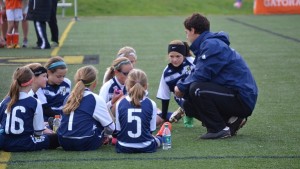How the business of youth soccer changed the player-coach relationship
 Note: This is the first in a weekly column by Joe Dougherty, a longtime soccer coach, writer and former player from Northern Virginia. Dougherty has coached high level youth soccer since 1987 at Braddock Road Youth Club, McLean Youth Soccer, Great Falls Soccer Club, VSA Heat and Arlington Soccer Association. He has coached players who have gone on to play professionally in MLS and other top leagues, and even make the U.S. Men’s National Team.
Note: This is the first in a weekly column by Joe Dougherty, a longtime soccer coach, writer and former player from Northern Virginia. Dougherty has coached high level youth soccer since 1987 at Braddock Road Youth Club, McLean Youth Soccer, Great Falls Soccer Club, VSA Heat and Arlington Soccer Association. He has coached players who have gone on to play professionally in MLS and other top leagues, and even make the U.S. Men’s National Team.
—
There are two kinds of Christmas tree ornaments: fillers, and those special ornaments that get triple-wrapped. In my house, one of the most special is shiny blue that simply says, “Vultures.”
I was given that ornament as a youngster, when I played for the 1965 Vultures in Braddock Road Youth Club. Back in the day, there was no U-whatever to signify an age group. It was all done by calendar year, not school year. And the ’65 Vultures was a special group.
So special that, nearly 30 years after our last game together, nearly half of us got together last weekend to celebrate the life of our coach, Marty Kilfeather.

Marty Kilfeather/”Coach K”
Coach K, who passed away Jan. 5, was our coach, friend and mentor. Indeed, I would argue he is the kind of coach that is very rare these days.
Youth soccer is far different now than in the 1970s and 1980s. The word “academy” was a scholastic term only, and almost nobody knew of Johan Cruyff, not to mention the Cruyff cut you often see in a youth game today.
+Read: Adult obsession with winning is killing youth sports in America
Imagine taking your child to a town in Long Island and dropping her off for the weekend with a family you have never met. Sound crazy? Well, that was standard operating procedure for away tournaments in the 70s and 80s. It was called “housing,” and if your club hosted a tournament, you were expected to welcome a visiting child or two into your home for the weekend.
Where were the parents? At a hotel, of course! I think it’s safe to say that as much as we players loved going to tournaments, our parents enjoyed it even more. The many Vultures parents with whom I spoke this weekend confirmed my suspicion.
Today, of course, that idea sounds preposterous. Tournament hotel expenses are like car payments – travel soccer families will always have them. Indeed, tournaments now demand teams stay at certain hotels or risk getting rejected by the event.
The style of soccer was different then, too. There were exceptional teams that could easily compete with the top youth teams of today. The ’59 Annandale Red Wings, the ’62 Annandale Spartans, the ’65 Braddock Road Eagles and Montgomery United Pintos were outstanding teams.
+Read: LeBolt: Five simple tests to identify increased risk of ACL tear
Today, however, there are more good teams, and far more good players, than even 10 years ago, not to mention 30 years ago. Today’s middle-of-the-pack NCSL Division 3 team would easily be a competitive Division I team. The large number of quality NCAA Division III programs illustrates how many good players there are today.
 In 1981, “possess the ball!” was not routinely shouted from the sideline, as it is today. Just about every team played with a sweeper and stopper. Flat back four? Hardly. As a sweeper myself, I thoroughly enjoyed whacking the ball down the field as far as I could kick it. Hitting the crossbar from midfield was not difficult.
In 1981, “possess the ball!” was not routinely shouted from the sideline, as it is today. Just about every team played with a sweeper and stopper. Flat back four? Hardly. As a sweeper myself, I thoroughly enjoyed whacking the ball down the field as far as I could kick it. Hitting the crossbar from midfield was not difficult.
Other than perhaps Stoke City or the Norwegian National Team, one won’t find much Route 1 soccer today. It’s all about possession, player movement and quality skill. That existed 30 years ago, but not like it does today.
But perhaps the biggest difference today is the player-coach relationship. And that brings us back to Coach K.
Marty Kilfeather was more than a soccer coach. He was truly a second father to many on the Vultures. On the sideline he was the demanding coach who knew how to motivate. And he was also the patient parent, aware of our personal tribulations and always there to help when needed.
Coach K was particularly special for me. I was just 10 years old when my father passed away, and travel soccer quickly became a job. The pressure to win was as intense then as it is now, and I wanted no part of it. I avoided contact, found no pleasure in the game, and seldom kicked the ball in my carport as I used to.
I was soon cut from my team. To this day, I remember telling my mom with a tear-streaked face, “I’m never playing soccer again!”
That’s when my mom turned to Coach K. I was warmly welcomed by the Vultures, and soon found myself enjoying the game as I did before my dad’s passing. The families welcomed the Doughertys as if we had always been on the team, which I know now must have been a true blessing to my mom, given I had two brothers and two sisters going through their own emotional pains at that time.
+Read: Manchester United’s Tony Strudwick shares youth development philosophy
 Coach K was not an A-licensed coach with a FIFA Badge and NSCAA National Diploma. Nor did he pretend to be. He kept the game simple, taught us the fundamentals of receiving, passing, crossing and shooting, and gave us the big picture talk before games. If we played below our potential, he let us know it. And when we played hard – maybe not well, but hard – his toothy smile was ear-to-ear.
Coach K was not an A-licensed coach with a FIFA Badge and NSCAA National Diploma. Nor did he pretend to be. He kept the game simple, taught us the fundamentals of receiving, passing, crossing and shooting, and gave us the big picture talk before games. If we played below our potential, he let us know it. And when we played hard – maybe not well, but hard – his toothy smile was ear-to-ear.
Off the field, the Vultures were true friends. There was never any concern about a player leaving for another team. It was a Brothers-in-Arms mentality, and the idea of moving to a different club was nearly traitorous.
Today, of course, club-hopping is not unusual. Teams often are not made up of kids from a neighborhood or one or two schools. Instead, players from Manassas, Woodbridge, Loudoun, Bethesda and Annapolis could all be on the same team. Full-time coaches don’t have much time developing relationships with players today because they coach three or four different teams; the idea of truly knowing and understanding a kid is hard when you are responsible for 65 or more of them.
Sitting down to enjoy a beverage with some of the team’s parents? Not encouraged. After all, people might talk. “Why is coach talking with those parents? Should I be over there? Does this mean my son will lose playing time?” Coaches realize they’re better off keeping their distance from parents and players. Scholarships are on the line. Youth soccer has become a business.
+Read: SoccerWire Q&A: Bayern Munich icon Paul Breitner on Bundesliga, USMNT, youth soccer
 And that’s a shame, because I know many of today’s youth coaches would love to replicate what we had with the Vultures. Today’s travel coaches, for the most part, are not in it for the money. They are teachers at heart, and they want to share their love and joy of the Beautiful Game with a new generation of players.
And that’s a shame, because I know many of today’s youth coaches would love to replicate what we had with the Vultures. Today’s travel coaches, for the most part, are not in it for the money. They are teachers at heart, and they want to share their love and joy of the Beautiful Game with a new generation of players.
Can the family friendly days of yesteryear be combined with today’s youth soccer environment? I think so. Here’s how:
- If you’re a parent, get to know your coach. Learn what he or she does for a living, what makes them want to coach, and why they love the game so much. Develop a relationship beyond a check-cutter and carpooler. And let the coach know that you have his or her back, regardless of results.
- If you’re a player, talk with your coach. Share ideas, ask questions, and let the coach know that you enjoyed a practice (or if you thought one didn’t work so well, and why). Be respectful, and don’t treat him or her as a peer. If you have a thought about how a game is going, share it respectfully. Over time, the two of you should develop a mutual respect and friendship that will last a lifetime.
- If you’re a team manager, arrange off-the-field events with the team’s families, particularly during the offseason. Parents often go an entire season without exchanging a friendly word with another parent. And invite the coach!
- If you’re a coach, make yourself available to parents after practices. Drop the “U.S. Soccer staff” speak and talk to them like a colleague on a mission to help the parent’s child become the best person he or she can be. Yes, you’ll get burned once in a while by an unhinged parent. But the relationship you build will most likely strengthen your effort to help the player grow on the field and off.
Coach Kilfeather’s legacy remains strong in the Vultures. That’s because he created a family culture. The Vultures won many more games than we lost, and my teammates and I shared some great on-the-field stories this weekend. But what meant the most to us was the tremendous influence Coach K was to all of us. I have coached youth soccer every year since 1988, and I hope I am giving back as much as I was given by Coach K. That is a wonderful legacy.
SOCCERWIRE MARKETPLACE
- visitRaleigh.com Showcase Series 2025, hosted by NCFC Youth
- OFFICIAL MANCHESTER CITY SOCCER CAMPS
- Wanted Licensed Youth Soccer Coach
- Join Official Elite Summer Soccer Camps with Europe’s Top Pro Clubs!
- The St. James FC Travel Staff Coach - North (Loudoun) & South (Fairfax)
- The St. James FC Girls Academy (GA) Head Coach - 2 teams
- The St James FC Boys Travel Tryouts
- OFFICIAL BAYERN MUNICH SUMMER CAMPS U.S.
- JOIN THE ALLIANCE!
- OFFICIAL FC BARCELONA CAMPS U.S.











